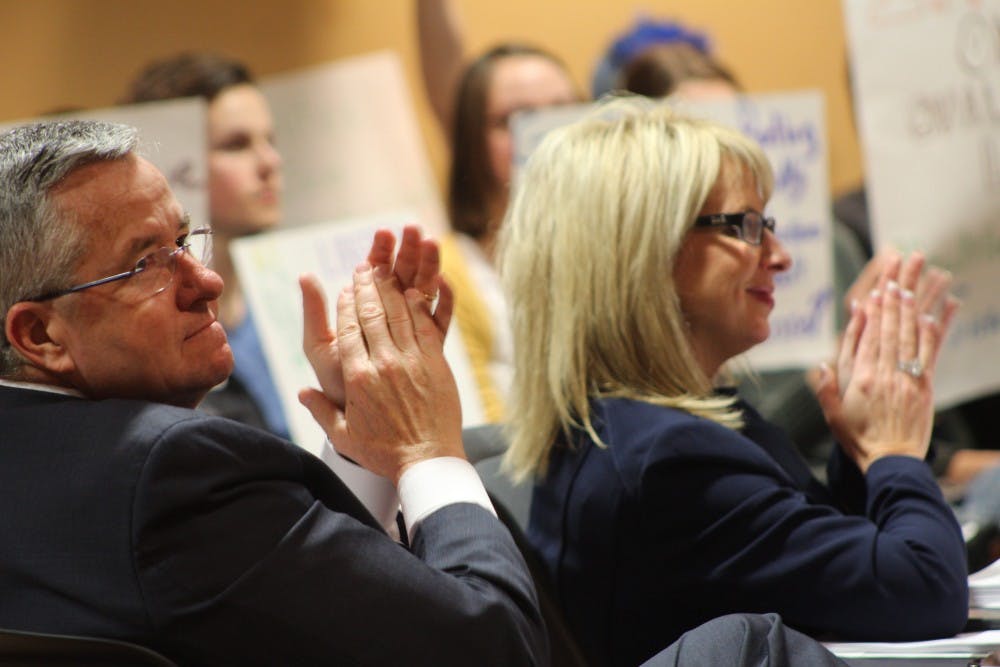Ball State's Counseling Center has seen the following increases just since the 2016-17 fall semester, when compared to the fall semester of 2015-16:
- Fourteen percent increase in request for services
- Forty-three percent increase in daytime urgent appointments
- More than double the number of after-hour urgent contacts
- Eight percent increase on screening appointments
As of Dec. 1, 2016, the Center was also no longer accepting new patients until Jan. 2017.
Following the latest board of trustees meeting Feb. 3, Ball State has approved employee benefits to promote a more "family-friendly work environment."
The new changes — which will take effect on July 1 — provide paid parental leave to full-time employees following the birth or adoption of a child. The birth mother, non-birth parent or adoptive parent will be provided with six weeks of paid leave (regular salary or pay) to be used for "bonding time" with a child. If both parents are employed by the university, each will receive six weeks of paid leave to be used within six months following the birth or adoption, and they have the option to take their leaves concurrently or consecutively.
To be eligible, employees must be full-time, benefits-eligible faculty, professional or staff with at least twelve months of service at the university.
"This is really great for our employees and faculty, and it keeps us competitive with other institutions," said board chairman Rick Hall. "I'm happy this has been discussed and brought to the table for approval."
Ball State joins Indiana University, Purdue University and five Mid-American Conference schools offering paid parental leave.
Marilyn Buck, acting provost and acting executive vice president for academic affairs, said the changes will also likely increase the university's appeal to younger employees.
"[The paid parental leave] additions will probably help us attract and maintain employees who are younger or maybe just starting families," Buck said. "This will be very good for us."
The board of trustees also approved changes to the employee sick leave policy.
Under current policy, faculty, professional and staff employees may use a limited number of sick days (five to ten depending on status) per fiscal year to care for a family member. But as a result of the approved changes, full-time and part-time employees can use an additional sixty days of earned sick leave balances to care for a family member with a serious health condition.
Full-time employees that are not eligible for paid parental leave will also be able to use up to fifteen days of accrued sick leave to care for a child, and part-time employees may use up to seven-and-a-half days.
According to the new policy, these changes will not require increasing the sick leave accrual rate for any of Ball State's employees.
At the meeting, trustees also discussed — but have not yet approved — changes to the university's Employee Assistance Program.
Through the program, the university currently offers employees low-cost counseling services through the Counseling Center to assist with productivity issues, personal concerns and other issues affecting job performance. However, after citing the recent influx in student requests for Counseling Center services, trustees recommended expanding employee resources off-campus.
Through the university's current lifestyle management service — Lifeworks — employees would be eligible for up to five free counseling sessions per year and 24/7 available communication with a master’s level health care professional.
Although the new services are estimated to cost approximately $59,000 per year, vice president of business affairs and treasurer Bernard Hannon said the investment is feasible.
"These changes would assist with confidentiality for our employees and open up more availability for the Counseling Center to serve students," Hannon said. "By re-evaluating our investments in other areas and cutting some costs in recent years, this is a positive result, something new we can invest in."
Student trustee Dustin Meeks also suggested that in addition to the proposed changes, expanding monetary allocations to the Counseling Center should be discussed during upcoming university budget meetings.
"There is clearly a need for the Counseling Center to receive more attention and resources," Meeks said. "On behalf of the students, this is something I would strongly recommend reviewing."
Members of the Progressive Student Alliance — present at the final board meeting of the day — expressed support for Meeks' statement with snaps, and some raised signs relaying concerns about the lack of available Counseling Center services currently available to students.
During the board's meeting, other approved items included the 2015-16 diversity report and a new undergraduate major in applied behavioral analysis with an emphasis in autism, which is anticipated to be offered to students within the next three years.
The discontinuation of the same-sex domestic partner program was also approved by the board. Hannon said three employees are currently in the program, and the discontinuation comes as a result of the 2015 Supreme Court ruling on marriage equality.





